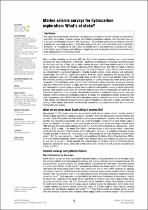| dc.description.abstract | With a coastline extending approximately 3900 km, South Africa exercises jurisdiction over a vast Exclusive
Economic Zone (EEZ) that exceeds 1.5 million km2
.
1
South Africa is located at an ecologically important crossroad
for inter-ocean exchange of heat, salt and biota2
involving the warm, fast-flowing Agulhas current of the Indian
Ocean and the cold, nutrient-rich Benguela upwellings of the Atlantic Ocean, and within the range of influence
of the world’s most biologically productive ocean3
, the Southern Ocean4-6. South Africa’s marine territory is
also characterised by spectacular topography, including dramatic canyons, slopes, plateaus, and seamounts.7
Unsurprisingly, South Africa’s complex oceanographic influences, coastal topography, and geology boasts 179
marine ecosystem types, with 150 around South Africa and 29 in the country’s sub-Antarctic territory.8 South
Africa may also be richly endowed with hydrocarbon deposits.9,10 Seismic surveys are a routine and key upstream
component of the hydrocarbon sector and crucial to understanding where recoverable oil and gas resources
likely exist. Hydrocarbon extraction is largely dependent on seismic data acquisition and processing technology,
with exploration companies relying on seismic survey results to decide whether or where to extract hydrocarbon
deposits. While seismic surveys pose an immediate threat to South Africa’s exceptionally rich marine life, the
downstream implications of such surveys – the extraction and use of non-renewable energy sources – are more
profound. | en_US |

